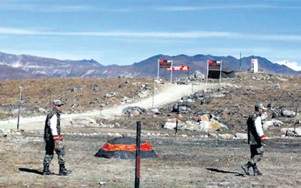Doklam episode demonstrates India’s civilisational approach
- By : Anirban Ganguly
- Category : Articles

By the time this column appears, the process of disengagement between India and China on the Doklam stand-off might have advanced to a great degree. This is indeed a major diplomatic victory for India and reflects the sagacity, maturity, foresight and fortitude of the leadership of PM Narendra Modi. Not since 1962 has such a situation been handled in a manner which displayed a blend of determination, pragmatism, realism and the will to protect and pursue India’s national interest.
The absence of rhetoric, hollow idealism and chest-thumping saw us through under the direction of a leadership that sees India as a once-again rising civilisation and not a mere appendage to some other dominant power. This has been Modi’s characteristic, his style, if one may so term it, of governance. His appeals for dissemination of transformative public knowledge, the exhortation to exceed ourselves for the cause of India’s collective good, the appeals to give up and reject all that retards our national march towards the status of great nationhood are made with dynamic conviction and fervent energy.
He has never acceded to empty rhetoric, public-posturing, and has rather silently gone about his work while weaving and implementing a saving strategy. The Doklam episode, like a few others in the last three odd years, is another example of his manner of functioning. He does this because of his core faith in the essential strength of the people and his conviction, which makes him see them as partners in India’s growth and not elements who need to be satisfied with doses of jingoism and false assurances. We have to start getting used to such an approach; it contributes to the movement of refining our public life.
In the formation and re-consolidation of the terms of Indian exceptionalism, the method in which Modi has handled the Doklam issue shall remain a chapter to be cited and studied by historians of strategy and civilisation. Over the last decade, an acute drishti dosha (false self-perception) had afflicted our national psyche. When ruled by uncertain minds, hesitant leaders, confused policy makers and an unclear political centre, the growth of this false self-perception takes rapid root, debilitates our decision-making powers, and dilutes our abilities not only to assess the challenging situation, but also to resist it. That drishti dosha has now to a great extent dissipated and continues to recede. The place that it yields is being filled with the sense of India’s civilisational status.
One of the characteristic attributes of Indian exceptionalism under Modi is the sense of international responsibility that India has been demonstrating. The rise of a civilisational state has to be a responsible and not a disruptive rise. The question that has exercised minds across the globe over the last decade has been related to China’s rise—whether that rise would eventually be a peaceful or a disruptive one? A civilisational power, at least under the Eastern philosophical rubric, has to display responsibility while trying to reassume its place among the comity of nations. The Chinese are yet to recognise that cardinal civilisational principle.
For India, however, such an approach is inherent in her Indic, Bharatiya approach and is being displayed distinctly now. She rises responsibly, she radiates her acceptance of, as Narendra Modi observes, “the rise of many powers”, she believes in an ‘inter-dependent’ and ‘inter-connected’ world, she visualises an Asian century which has the space, dimension and framework for the rise, co-existence and collective action of many powers of the region. Her approach to other powers is civilisational and backed by the will to protect, preserve and perpetuate her own global interests. The Doklam episode has demonstrated the strength of that approach.

















